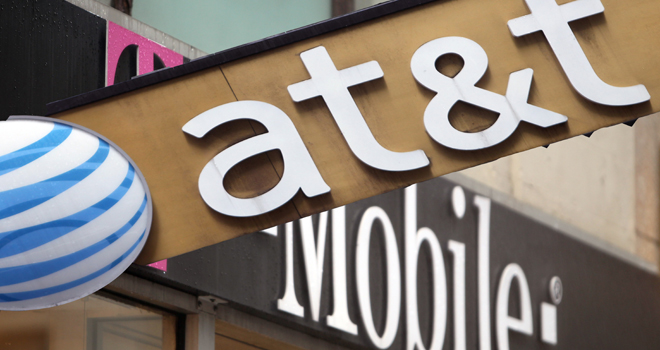AT&T’s proposed $39 billion mega-merger with T-Mobile to create a mammoth wireless company was controversial from the start, and judging by AT&T’s early effort to rack up political support for the deal, the company knew it would face stiff opposition.
The Obama administration’s Wednesday move to stop the merger on an expedited basis cast even darker clouds over its prospects, and it shows that the administration doesn’t think the stated benefits of AT&T’s merger outweigh its cost to innovation in the long run.
The Justice Department’s move is striking because AT&T has won the support of many Democrats in Congress. They’ve apparently bought the argument that AT&T will create jobs and wireless access for their constituents. (Other powerful Democrats in the Senate have opposed the deal.)
The department’s complaint on Wednesday makes clear how vital the administration believes wireless communications have become to fostering a thriving economy.
The issue is that it doesn’t agree with the House Democrats who have bought AT&T’s promises that the acquisition will foster innovation.
Justice department lawyers pointed to T-Mobile’s ambitious business plans, “disruptive” pricing plans for subscribers, and its introduction of cool phones like the Sidekick, the Android handset and Blackberry wireless e-mail, and its system of allowing subscribers to create their own WiFi hotspots as examples of how the company has innovated and kept the market competitive.
Once that competition has gone, AT&T isn’t likely to have the incentive to build out its network and introduce its own line of innovative handsets, they argued.
One of the driving forces behind this deal is AT&T’s promise to wire up the country to get everyone connected to the internet with its next-generation LTE technology. It has said it can only do so if it is allowed to merge with T-Mobile. It’s not entirely clear what will incentivize a company to blanket the country with high-speed, wireless internet access (one of the Obama administration’s goals,) but it’s hard to imagine, given “Ma Cell” ‘s history, that a bigger company with fewer meaningful competitors would foster more innovation. By that logic, AT&T should never have been broken up, and they should have been allowed to control all of the devices operating on their networks as they once wanted to. Many historians of the telecom industry have long argued that the result would have been that we would never have had the internet that we do today.
Bert Foer, an influential advocate for strong antitrust enforcement through both the Bush and the Obama administrations, tells TPM that the Obama administration has chosen strategically in this case, and that it has a good chance of prevailing.
Foer is the founder of the American Antitrust Institute in Washington, D.C. The group has asked both the Federal Communications Commission and the Justice Department to stop the merger.
“Horizontal mergers [like this one] immediately eliminate some competition,” and legal cases against such mergers are easier to argue and win in conservatve courts, Foer said. “It’s easier to show what the competitive impacts are going to be.”
“In vertical mergers, there are more theories about why vertical relationships are more positive in terms of the efficiencies they can produce — conservatives have always taken the position that vertical mergers are pro-competitive, whereas others are more skeptical,” he explained.
That explains why the Obama administration hasn’t been more aggressive in trying to stop mergers like the Comcast/NBC-Universal deal, and others like TicketMaster and LiveNation, and Google and travel software company ITA, he said. It’s difficult to win those “vertical integration” cases in conservative courts.
“There’s nothing radical about this case,” he said. “I think there’s a strong case here … obviously we think it’s strong, otherwise we wouldn’t have urged them to bring it. I don’t think the facts are in dispute — the question is whether the national geographic market is accepted by the court, and if it is, it’s s slam dunk on the basis of the concentration numbers.”
Whatever happens in this case, the FCC is going to have to weigh in, and they have additional considerations in addition to competition to weigh, say analysts.
Nevertheless, Jonathan Rubin, an independent antitrust lawyer in Washington, DC, notes that the FCC’s current chief economist Marius Schwartz is a noted antitrust and telecom veteran who’s overseen many telecom mergers over time as part of previous administrations. He’s likely to cast a critical eye.
That viewpoint was bolstered by FCC Chairman Genachowski’s statement earlier Wednesday when he said that the commission has some deep reservations about the deal.
As Acting Assistant Attorney General Sharis A. Pozen said Wednesday in a press conference announcing the lawsuit, “we’ll have to see what happens next.”









